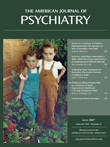Can Traumatized Children Report Revenge Fantasies?
To The Editor: I would like to commend Mardi J. Horowitz, M.D., for a stimulating review of an adult patient with posttraumatic stress disorder (PTSD) who had ego-dystonic revenge fantasies and how these fantasies were approached in therapy (1) . Dr. Horowitz’s article emphasized the importance of working through revenge fantasies as part of psychological recovery from trauma. As a child psychiatrist, I have not been able to access my patients’ revenge fantasies, despite being involved in the treatment of PTSD. I suspect that I have seen two variants of revenge fantasies: 1) children acting in an oppositional or conduct-disordered way toward people who are not their aggressors and 2) the transient suicidal and self-harming behaviors of children who appear to identify with their aggressors. In both instances, the children are not thinking or articulating that they would want to harm their aggressors, but their feelings of guilt and helplessness are managed by aberrant behaviors that help to organize these emotions.
Revenge fantasies are likely common in traumatized youth (2) . They may be challenging to identify because the majority of traumatized children are under the care of child welfare services and have ambivalent relationships with past or current caregivers who may have perpetrated these traumas. These children are often instinctively motivated to attend to the positive aspects of these relationships and are not cognitively or emotionally able to consider a balanced view of their aggressors as individuals who are deserving of punishment. Perhaps this is because of the child’s dependency on adults in a stable environment, although these adults might change, and the child then develops an attachment to a new caregiver.
I have treated traumatized adolescents who are able to articulate that their caregivers hurt them and that it was wrong. Most of these youth are still very emotionally and behaviorally affected. I am unsure as to whether asking about thoughts of revenge would be helpful to the therapeutic process.
1. Horowitz MJ: Understanding and ameliorating revenge fantasies in psychotherapy. Am J Psychiatry 2007; 164:24–27Google Scholar
2. Shepperd R: Individual treatments for children and adolescents with post-traumatic stress disorder: unlocking children"s trauma, in Post-Traumatic Stress Disorder in Children and Adolescents. Edited by Dwivedi KN. Philadelphia, Whurr Publishers, 2000, pp. 131–146Google Scholar



